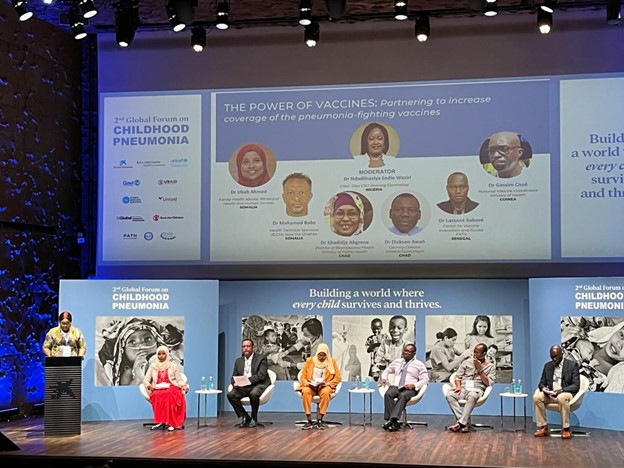
Four more African countries commit to rotavirus and pneumococcal vaccines

At the 2nd Global Forum on Childhood Pneumonia, leaders renewed commitments to accelerate progress in child survival. Photo: Every Breath Counts.
Every year in Somalia, diarrhea infections claim the lives of 9,000 children younger than five years old. That means, every day, enough children to fill a school bus never make it home. The problem is more than medical: displacement, drought, conflict and poverty each take their toll on young bodies. Economic, social, environmental, and behavioral factors overlap to work against families and young children in Somalia.
Unsafe water and unsanitary environments are common links among these factors. Inequity in access to clean water and sanitation is a primary cause of diarrheal disease in Somalia and other low-income countries. But even WASH interventions aren’t enough to stop rotavirus, the leading cause of severe childhood diarrhea disease. Prevention is urgent. As vaccine pioneer Ruth Bishop noted, “The best way to protect children from deadly disease is to prevent them from getting it in the first place.”
Recognizing the urgency of child health, the Government of Somalia will bring vaccines against rotavirus to all children in 2024. Somalia joins three additional African countries in this commitment, shared the news at the Global Forum on Childhood Pneumonia, held last month in Spain. Chad, Guinea, and South Sudan will also introduce rotavirus vaccines next year. Protection against a leading childhood threat like rotavirus is a worthy milestone, but these countries expanded their pledges to include pneumococcal vaccine introduction, as well.
Worldwide, hundreds of thousands of children lose their lives to pneumococcal disease and rotavirus each year, and millions more are hospitalized. Where they are available, safe and effective vaccines have clearly demonstrated impact in reducing child morbidity and mortality. “Delaying further introduction of these vaccines means continuing to endure unnecessary and preventable deaths,” said Dr. Lassane Kabore, Senior Program Officer for PATH’s Center for Vaccine Innovation and Access. “We should endeavor to avoid such an inequitable and unethical situation.”
 Souce: Every Breath CountsAccording to the latest indicators in the Global Action Plan for Diarrhea and Pneumonia, these illnesses take the live of more than 25,000 Somalian children annually, and they are the leading causes of global child mortality. Strategies to overcome them are often combined, and progress is tracked in tandem because several interventions, like immunization, overlap. The two diseases also share many risk factors, and integrating policies and programs that address both can have enhanced impact.
Souce: Every Breath CountsAccording to the latest indicators in the Global Action Plan for Diarrhea and Pneumonia, these illnesses take the live of more than 25,000 Somalian children annually, and they are the leading causes of global child mortality. Strategies to overcome them are often combined, and progress is tracked in tandem because several interventions, like immunization, overlap. The two diseases also share many risk factors, and integrating policies and programs that address both can have enhanced impact.
Across the African continent and in all countries where they are in use, rotavirus and pneumococcal vaccines are cutting hospitalizations and deaths, easing the burden for families and health systems. Vaccine introduction in Somalia, Chad, Guinea, and South Sudan will protect infants today, amid ongoing and emerging crises. A commitment to prevention and immunization will deliver children their best chance at a healthy future.


